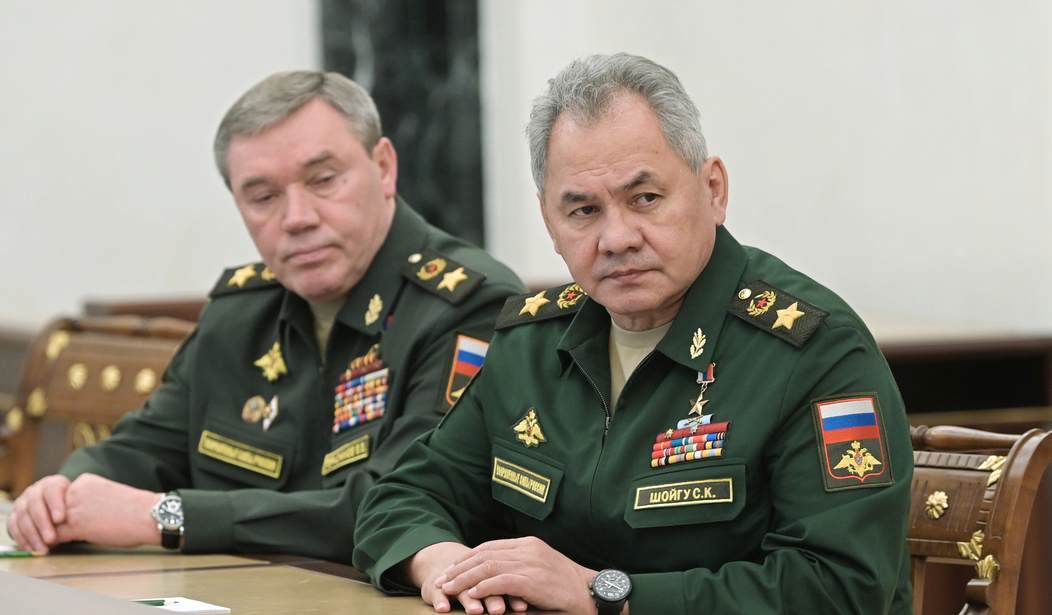No big deal. Just the U.S. and Russia not talking to each other at a moment when the White House is wargaming WMD scenarios because no one’s sure how crazy Putin might get.
WaPo reports today that Lloyd Austin and Mark Milley have spent weeks trying to get their Russian counterparts, Sergei Shoigu and Valery Gerasimov, on the phone with no luck. I can think of three possible explanations.
“There is a high risk of escalation without the firebreak of direct contact between the most senior officials,” said James Stavridis, who served as the Supreme Allied Commander at NATO from 2009 to 2013. “Very young people are flying in jets, operating warships, and conducting combat operations in the Ukrainian war. They are not seasoned diplomats, and their actions in the heat of operations can be misunderstood.”…
Sam Charap, a senior political scientist at Rand Corporation, said calls by Austin and Milley serve a “fundamentally different purpose” than the deconfliction channel.
“One is about tactical accident avoidance. The other about strategic engagement,” he said. “It’s always important to maintain the strategic level to communicate our interests clearly and better understand theirs. When there’s no communication at that level, their worst-case assumptions, often based on poor information, are more likely to drive their behavior.”…
“A nightmare scenario would be a Russian missile or attack aircraft that destroys a U.S. command post across the Polish-Ukrainian border,” said Stavridis, a retired admiral. “A local commander might respond immediately, thinking the event was a precursor to a wider attack. This could lead to rapid and irreversible escalation, to include potential use of nuclear weapons.”
Maybe Shoigu and Gerasimov are deliberately snubbing the U.S., whether on their own authority or under orders from Putin. WaPo notes that “Putin may now view the United States as a determined adversary bent on his downfall and not worth engaging,” citing the fact that Biden recently called him a war criminal.
Another possibility is that the snub is strategic. Russia might calculate that if Austin and Milley can’t get in touch with the Russian high command to clarify misunderstandings on the battlefield, the U.S. will be more likely to proceed timidly and to avoid scenarios where misunderstandings might plausibly happen.
The third possibility is that Shoigu and Gerasimov are … indisposed. Last night I wrote about Shoigu’s mysterious disappearance from public view over the last two weeks. Gerasimov, the military chief of staff, has also been absent from public appearances. Are they dead, scapegoats for Putin’s misadventure in Ukraine? Are they alive but under house arrest?
News broke this morning that Shoigu turned up within the past 24 hours — sort of. That appears to be him in the upper left-hand corner on Putin’s monitor:
A sighting of Sergei Shoigu at Putin’s security council.
The PR-mad Russian defense minister hadn’t even been mentioned in state media for nearly 2 weeks.
Peskov says Shoigu “has a lot on, there’s a special military operation and it’s not really the time for media activity.” pic.twitter.com/AmvimuNoKS
— max seddon (@maxseddon) March 24, 2022
Note the strange “cut” in the video that precedes his appearance. Is something fishy there?
After long rumors that Putin decided to remove Shoigu forever, they decided to show him on TV as participant of the government meeting. However, viewers noticed oddities during the broadcast. Pay attention to the top left corner. pic.twitter.com/xZD1wFCbJU
— NEXTA (@nexta_tv) March 24, 2022
Even if that’s a live feed, it wouldn’t exclude the house-arrest possibility.
U.S. officials did get some face time with Russian military officers recently, CNN said this morning, but the encounter was … unusual. It happened last week at the Russian ministry of defense in Moscow:
It makes particular note of the behavior of Russian Major General Yevgeny Ilyin, deputy chief of the main directorate of international cooperation who has a long track record of dealing with American officials. In a break from typical practice, Ilyin spoke with no notes or set talking points, according to the readout.
As the meeting was breaking up, one US defense attaché “casually inquired” about Ilyin’s family roots in Ukraine, and the Russian general’s “stoic demeanor suddenly became flushed and agitated,” according to the readout. The Americans reported Ilyin responded “yes,” and said that he was born in Dnipropetrovsk before moving with his family to Donetsk, where he went to school.
But the US officials reported Ilyin then added that the current situation in Ukraine is “tragic and I am very depressed over it” — and then he walked out without shaking hands, according to the readout.
The Americans present didn’t know what to make of it. On the one hand, CNN claims they got the sense that Ilyin was blaming the U.S. and Ukraine for what his Ukrainian relatives are experiencing right now. (“The fire in his eyes and flustered demeanor left a chill down the spine.”) On the other hand, they came away thinking that Ilyin knows where the ultimate culpability for the war lies but couldn’t say so, and so he chose to channel his anger at the Americans instead.
Which is good news in a sense. Russian officers being “depressed” about the war is a necessary prerequisite to Putin ultimately being ousted. But if the Russian military follows Ilyin’s lead by lashing out at Americans and Ukrainians because it can’t lash out at Putin then things in Ukraine — and possibly beyond Ukraine — are about to get darker.
Your exit quotation comes from today’s NYT story about the White House pondering what to do if Putin goes nuclear, leading radioactive fallout to waft across Ukraine’s borders and into NATO territory: “One issue under examination is whether such collateral damage would be considered an ‘attack’ on NATO under its charter, which might require a joint military response.”








Join the conversation as a VIP Member